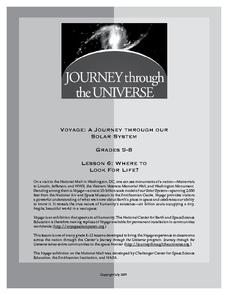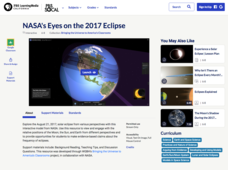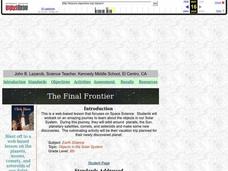Curated OER
Doin' The Moonwalk
If you are looking for an outstanding instructional activity on the Moon for your budding astronomers, look no further! This outstanding plan is full of wonderful, meaningful activities for your charges to engage in. Pupils will discover...
NASA
Lunar Plant Growth Chamber
Would astronauts be able to grow their food on the Moon? Teams research plant growth in order to design and build a growth chamber that will function on the lunar surface. They narrow down plant choices based upon their strengths and...
Journey Through the Universe
Where to Look For Life?
Every year we discover new planets including more than 1,000 in 2016 alone. Will we ever find life on another planet? The lesson includes two activities to help scholars understand this concept. First, they analyze the temperature range...
It's About Time
Reflected Light
The lesson allows young scientists to use lasers and mirrors to study reflected light. A reading passage and homework question assess learning, while additional material introduces extension activities.
PHET
Features of the Sun
There are so many things to discover about the sun! Pupils discuss their knowledge of the sun, explore its features, apply their knowledge by labeling photographs, and then reflect on their learning by working in groups to draw and label...
PBS
NASA's Eyes on the 2017 Eclipse
How did the 2017 eclipse look in Los Angeles—or Chicago? Experience both views, plus many more, using a lesson from PBS's Space series for middle schoolers. Scholars follow the movements of the sun, moon, and Earth during the most recent...
Curated OER
Planets in Our Solar System
Each member of a four-student group takes on a specific aspect of an assigned planet to research. After gathering information, the team works together to create a travel brochure and a presentation intended to convince other classmates...
Columbus City Schools
What is Up Th-air? — Atmosphere
Air, air, everywhere, but what's in it, and what makes Earth's air so unique and special? Journey through the layers above us to uncover our atmosphere's composition and how it works to make life possible below. Pupils conduct research...
NASA
Collecting Electromagnetic Radiation
Astronomy is literally over your head, but this lesson will explain how we study it. Young scientists make telescopes, calculate and compare the light gathering power of lenses, and simulate detection of infared radiation. Materials...
Teach Engineering
An Inflated Impression of Mars
Help your class understand the magnitude of the distance between Earth and Mars with an activity that asks small groups to use balloons to create scale models of the Earth, Moon, and Mars. Class members figure out the distances between...
BBC
Sorting and Using Materials
First and second graders see that everyday objects are made from a variety of materials. They interact with objects such as keys, plastic spoons, a wooden ruler, a towel, and a plastic bag. A discussion ensues which leads them to...
Space Awareness
Meet Our Neighbors: Sun
The sun isn't just a ball of yellow! Young scientists learn about the features of the sun using a hands-on modeling activity. They build models of the sun using common household items to represent sunspots, solar prominence, and the...
International Technology Education Association
Dampen That Drift!
The spacecraft is drifting too far off course! Two games help explain how a spacecraft can use its thrusters to maintain its position. The games have pupils be the components of vectors in order to create and counteract the disturbances.
BBC
Ourselves
Young biologists identify parts of the body, sort humans from other animals, and list the difference they see. Learners are split up into groups of three, and each group must find pictures in magazines of humans and other animals. They...















